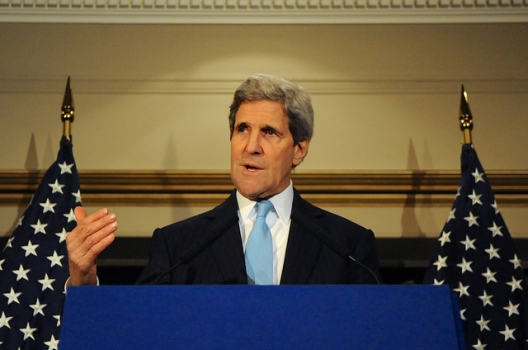 Secretary of State John Kerry’s Syria-related testimony of April 9th to the Senate Foreign Relations Committee attracted the attention of many at the Lebanese Army’s Fourth Annual Strategic Conference in Beirut. Kerry confirmed in his testimony that his September 2013 characterization of pending American airstrikes as an “unbelievably small, limited kind of effort” was literally accurate. As one Lebanese proponent of humanitarian military intervention put it, “I have changed my mind completely. Thank God President Obama did not strike. If he had done what Kerry described, the United States would be a laughingstock.”
Secretary of State John Kerry’s Syria-related testimony of April 9th to the Senate Foreign Relations Committee attracted the attention of many at the Lebanese Army’s Fourth Annual Strategic Conference in Beirut. Kerry confirmed in his testimony that his September 2013 characterization of pending American airstrikes as an “unbelievably small, limited kind of effort” was literally accurate. As one Lebanese proponent of humanitarian military intervention put it, “I have changed my mind completely. Thank God President Obama did not strike. If he had done what Kerry described, the United States would be a laughingstock.”
Last September, with Congressional opposition mounting after President Obama had tossed the hot potato of airstrikes to the legislative branch, Kerry tried to assuage concerns by forswearing boots on the ground “or any other prolonged kind of effort.” Instead there would be “a very limited, very targeted, short-term effort that degrades [Assad’s] capacity to deliver chemical weapons without assuming responsibility for Syria’s civil war. That is exactly what we are talking about doing—unbelievably small, limited kind of effort.”
Last week Kerry again used the smallness of the long-since discarded airstrike option to try one more time to disarm Congressional critics—this time senators who maintained that the Obama administration had missed a golden opportunity to do what John Kerry said needed to be done when he first assumed his present duties: change Bashar al-Assad’s calculation about peaceful, negotiated political transition. According to Kerry, the strikes being considered “would not have a devastating impact by which [Assad] had to recalculate, because it wasn’t going to last that long.” In other words, don’t worry: we aimed for Assad to take us seriously, but not all that seriously.
No wonder President Obama dropped the whole idea like a bad habit when offered the opportunity to see Assad’s chemical capabilities neutralized and chemical weapons removed. Given the nature of the choice—do something militarily insignificant in the hope of sending a message as opposed to eliminating a toxic capability altogether—the president did the right thing. Yes, he should have gotten binding humanitarian provisions appended to the chemical weapons agreement: the Assad regime has been on a non-chemical killing frenzy ever since it was spared the wrist-slapping. But if the military strike option was as described by Secretary Kerry, its implementation would have enabled Bashar al-Assad to heap verbal contempt on the United States while drawing smiles of satisfaction in Tehran and Moscow.
There had been indications in late August and early September 2013 that one option being considered was to destroy delivery systems used by the Assad regime as weapons of mass civilian terror: aircraft, artillery, rockets, and missiles. Such an operation surely would have taken more than a day or two, though not the “30,000 sorties and 30 days” Kerry told the Senate it took to “have an impact” in Bosnia. Had a humanitarian mission of this nature been successfully implemented, tens of thousands of Syrian dead and refugees would today be alive and in their homes. Would Assad’s calculation with respect to serious negotiations have changed? Perhaps not. But his capability to inflict wholesale slaughter and terror would have been curtailed significantly.
The application of military force is, quite literally, deadly serious. No civilized country would employ it as a first resort; non-violent diplomacy must run its course before lethality is even considered. But when military force is considered it should aim for an end-state worth achieving. That the commander-in-chief thought about doing something “unbelievably small” that would “degrade and send a message” at least pushed back on Pentagon demands that the ultimate end-state for all of Syria be unveiled before a shot is fired. Yet the question is whether a minor degrading of capabilities and the sending of a message—perhaps the opposite of the one intended given the puny nature of the endeavor—would have been worth the application of lethal force. Clearly something aimed at real civilian protection—destroy or significantly degrade the ability of the Assad regime to bring massed fires to bear on civilian populations—would have been worth it.
President Obama, as commander-in-chief, has framed the military option for Syria as either something unbelievably small or the full Monty: invasion and occupation. It is a false choice. Yet it is the choice to which he has deliberately limited himself. And given that false choice he was correct to grasp onto the chemical weapons agreement. Had he paid more attention to civilian protection he would have sought a better agreement. Syrians and their neighbors are paying heavily for a diplomatic shortfall that was and is unbelievably huge.
Frederic C. Hof is a resident senior fellow with the Atlantic Council’s Rafik Hariri Center for the Middle East.
Image: Photo: US State Department
